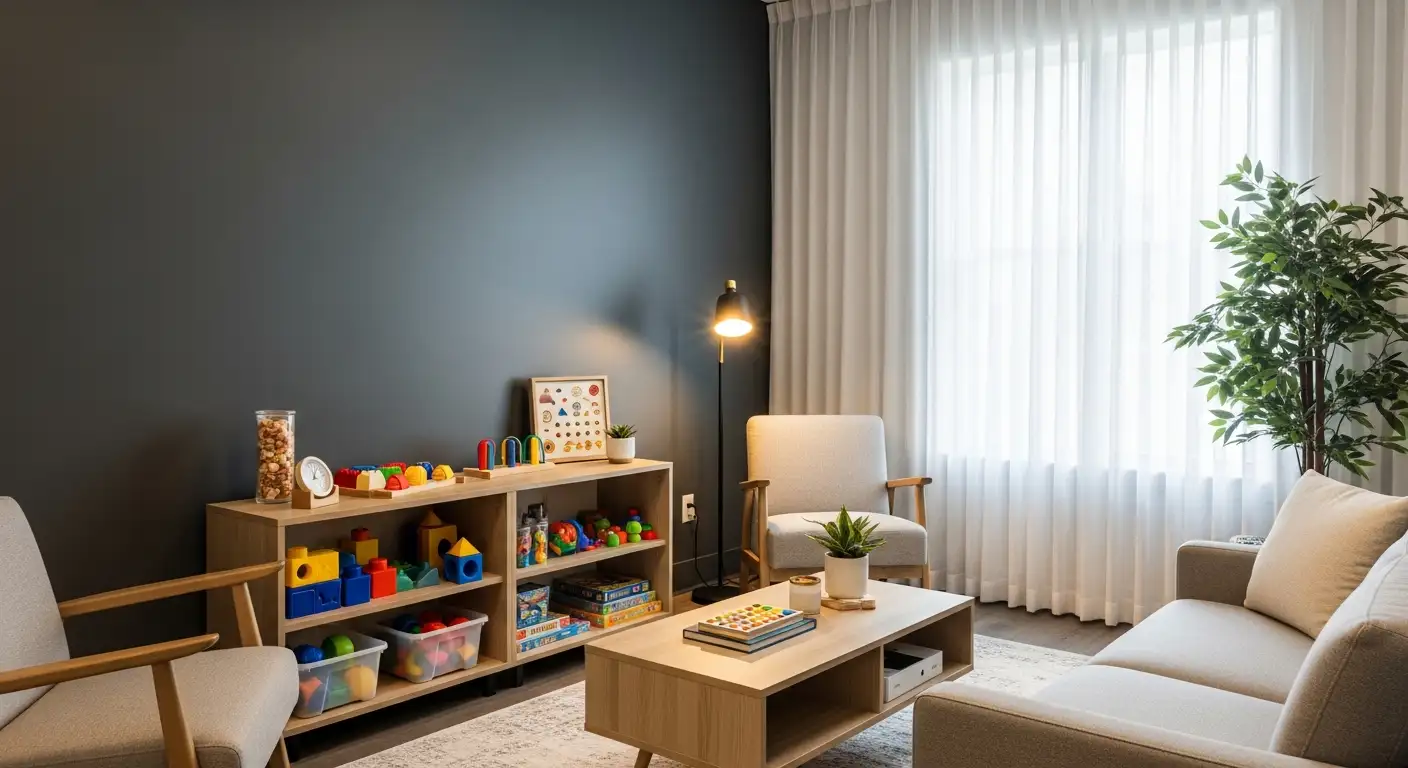Navigating College with Autism: A Guide for Students, Families, and Educators
The landscape of higher education is evolving to better serve students with autism spectrum disorder (ASD). Across the United States, numerous specialized programs and resources are dedicated to fostering independence, academic achievement, and social integration for autistic learners. This article explores the diverse support systems, inclusive college environments, and strategic considerations essential for success in post-secondary education for students on the spectrum.
Overview of Autism Support Programs in Higher Education
 Many colleges across the United States have recognized the importance of supporting students with autism spectrum disorder (ASD) by developing specialized programs tailored to their unique needs. These offerings range from comprehensive support services to targeted programs designed to assist with academic, social, and independent living skills.
Many colleges across the United States have recognized the importance of supporting students with autism spectrum disorder (ASD) by developing specialized programs tailored to their unique needs. These offerings range from comprehensive support services to targeted programs designed to assist with academic, social, and independent living skills.
What types of programs are available?
Support programs come with various structures and focuses. Some colleges provide dedicated offices or centers like the College Autism Program at Mercyhurst University, which offers personalized academic, social-emotional, and vocational support. Others, such as the Autism Support Program at Carnegie Mellon University or the Spectrum Program at Clemson University, emphasize career readiness, social skills development, and executive function coaching.
A significant number of colleges also offer online or hybrid options, which specifically cater to students who may experience sensory sensitivities or social anxiety. For example, Arkansas State University’s EduCare supports online degree learners with mentorship and skill building.
In addition, community colleges, like Golden West College with its College Autism Program (CAP), serve as stepping stones. These institutions help students develop independence and manage the academic load before transitioning to four-year universities.
What are the core components of these support initiatives?
Many programs share common features designed to foster success. These include:
- Academic Coaching: Personalized assistance in organization, time management, and study strategies.
- Social Skills Training: Group activities, peer mentoring, and one-on-one coaching to improve communication and social interaction.
- Executive Function Support: Focus on skills like planning, organization, and problem-solving, often using tools such as visual schedules and digital planners.
- Vocational Resources and Career Development: Workshops, internships, and mentorship programs aimed at preparing students for employment.
- Counseling and Mental Health Services: Addressing emotional and behavioral needs with trained professionals.
- Peer Mentoring and Social Activities: Providing students opportunities for social engagement and building a community.
Which universities have notable autism initiatives?
A variety of institutions stand out for their dedicated programs:
| University | Program Name | Support Focus | Cost | Notable Features |
|---|---|---|---|---|
| Mercyhurst University | Autism Initiative | Academic, social, vocational support | Free for enrolled students | Social skills, peer mentoring, dual enrollment courses |
| Carnegie Mellon University | College Autism Support Program | Career readiness, social success | No extra fees | Personalized training, job prep, inclusive campus culture |
| University of Alabama | UA-ACTS | Academic and behavioral support | ~$3,000/semester | Combines academic coaching with behavioral strategies |
| Nova Southeastern University | Access Plus | Full scope, including counseling and job support | ~$8,000/semester | Comprehensive, tailored to individual needs |
| Western Kentucky University | Kelly Autism Program (KAP) | Mentoring, mental health, social activities | ~$5,000/semester | Circle of Support, social outings, mental health counseling |
| Drexel University | Autism Support Program | Academic, social, career success | No extra fees | Peer mentoring, inclusive supports, recognized as exemplary |
| University of North Florida | THRIVE | Social skills, independent living, career | Free | Supports at no cost, holistic approach |
Can individuals with autism successfully complete a college degree?
Many students with autism do well in an academic environment, particularly if they have access to appropriate support, though some may find college overwhelming or challenging. With tailored programs, mentorship, and accommodations—such as extended testing time, sensory-friendly housing, or assistive technology—students are increasingly able to succeed and graduate.
Do autistic students qualify for scholarships or financial support?
Yes, autistic students can qualify for various scholarships and financial aid programs to help fund their college education. Many organizations and institutions offer scholarships specifically designed to support students with autism spectrum disorder (ASD), recognizing their unique needs and potential. In addition to specialized scholarships, autistic students can also apply for federal and state financial aid by completing the FAFSA, which is a crucial step in accessing funding opportunities.
Trusted resources like Edvisors and similar websites provide valuable information on navigating these financial aid options, including tips on student loans, private funding, and money management. Overall, autistic students have multiple avenues to secure financial support, promoting greater access and inclusion in higher education.
This growing landscape of programs and supports highlights the ongoing efforts to make college a more accessible and supportive environment for students on the autism spectrum. As awareness and resources expand, more students are finding pathways to academic and personal success in higher education.
Core Components of College Support Programs for Autistic Students

What factors should autistic students consider when choosing a college?
When selecting a college, autistic students need to carefully evaluate the support services and environment that will best suit their needs. Important factors include the range and quality of dedicated programs such as academic coaching, social skills development, and peer mentoring. These programs can significantly enhance their college experience by promoting independence, self-advocacy, and social integration.
Support services like counseling, assistive technologies, sensory-friendly spaces, and accommodations are vital. Students should verify if the college staff are trained in neurodiversity and autism-specific strategies. Early communication with disability services can clarify the process for requesting accommodations and support.
Visiting campuses or exploring virtual tours can help students assess sensory sensitivities, campus accessibility, and overall inclusivity. Practical considerations such as location, housing options, financial aid, and availability of specialized support also influence the decision.
Colleges with comprehensive autism programs often include personalized support plans tailored to each student's goals. These plans encompass academic, behavioral, and social objectives, which aim to foster success and well-being.
Overall, choosing the right college involves matching one's individual needs with the available resources, campus culture, and community support network.
Examples of University-Specific Support Initiatives
 Several universities have developed dedicated programs to assist students with autism in their transition to college and their ongoing success. These initiatives often include a combination of academic coaching, social skills groups, peer mentoring, life skills training, and targeted support services.
Several universities have developed dedicated programs to assist students with autism in their transition to college and their ongoing success. These initiatives often include a combination of academic coaching, social skills groups, peer mentoring, life skills training, and targeted support services.
One prominent example is the University of Alabama’s UA-ACTS (Autism Spectrum Disorders College Transition and Support Program). This program offers comprehensive academic and behavioral support tailored to students with autism, with assistance in developing independence and navigating campus life. The cost for this program is approximately $3,000 per semester, reflecting its personalized and intensive support model.
Drexel University’s Autism Support Program stands out for its holistic approach, providing peer mentoring, social events, and workshops aimed at fostering academic success and social integration. Recognized as an exemplary program, Drexel’s services are inclusive and designed to help autistic students build skills necessary for both college and career readiness without additional charges. This program emphasizes peer-to-peer connection and skills development to promote independence.
Mercyhurst College’s Autism Initiative, established in 2008, exemplifies an integrated support model, serving over 70 students annually. It offers social skills development, academic support, vocational resources, and assistance with housing. Notably, Mercyhurst’s program is part of its broader commitment to autism support, ranking as a top institution nationally for students with autism. It also hosts dual enrollment courses, providing college credit remotely at no additional cost. The program emphasizes personal development, employment pathways, and social engagement.
Eastern University provides a College Success Program (CSP) that offers specialized support to students on the autism spectrum. This program includes academic coaching, social skills training, and advocacy services designed to foster independence and academic achievement. The faculty and staff are trained to understand the unique needs of neurodivergent students, creating an inclusive college environment.
These programs reflect a growing recognition of the importance of tailored support for autistic students. They typically incorporate evidence-based practices, focus on fostering self-advocacy and independence, and provide social opportunities to help students succeed academically and socially.
Below is a summary table highlighting some notable programs:
| University | Program Name | Cost (per semester) | Core Services | Additional Notes |
|---|---|---|---|---|
| University of Alabama | UA-ACTS | $3,000 | Academic, behavioral, life skills | Comprehensive support for transition |
| Drexel University | Autism Support Program | Free | Peer mentoring, social events, workshops | Inclusive, peer-led, recognized nationally |
| Mercyhurst College | Autism Initiative | Varies, often free | Social skills, academic, vocational support | Serves 70+ students annually |
| Eastern University | College Success Program | Not specified | Academic coaching, social skills | Focus on independence and persistence |
Overall, these programs exemplify the commitment of higher education institutions to inclusively support students with autism, aiming to maximize their potential and ensure a successful college experience.
Financial Considerations and Support Options

Are autistic students eligible for scholarships and financial aid?
Autistic students have various avenues to access financial support for college education. Many organizations recognize the unique challenges faced by students on the autism spectrum and offer scholarships specifically tailored to their needs. For instance, nonprofits and advocacy groups often provide grants to help reduce the financial burden.
In addition to specialized scholarships, students are encouraged to complete the Free Application for Federal Student Aid (FAFSA). This application opens pathways to federal grants, loans, and work-study opportunities that can significantly offset college costs.
Furthermore, numerous colleges offer their own financial aid packages and scholarships aimed at neurodivergent students. For example, programs like the Autism Support Program at Mercyhurst or the College Autism Program (CAP) at Golden West College include support services that may be funded through scholarships or grants.
Some specialized programs charge fees, with costs reaching up to $9,000 per semester, like at Nova Southeastern University. However, many students access financial aid to help cover these expenses. Scholarships provided by state agencies, private foundations, and colleges themselves help ensure that more students can participate fully in higher education.
It is also beneficial for students and families to explore external funding sources — including community organizations, local nonprofits, and national foundations dedicated to autism support. These resources broaden the financial landscape, making college a more feasible goal.
In summary, students with autism are eligible for a variety of scholarships, grants, and financial aid programs designed to support their educational pursuits. Proactive application and research can significantly reduce costs and support successful college experiences.
Choosing the Right College and Major
What support services and campus environment are available?
Colleges that support autistic students typically offer a variety of tailored services designed to foster academic success and social integration. These include academic coaching, social skills groups, peer mentoring, executive functioning support, and mental health services. Many programs also provide sensory-friendly housing options, assistive technologies, and specialized staff trained to serve neurodiverse students.
The campus environment is often adapted to be autism-friendly, with quiet zones, sensory-friendly dorms, and organized social events aimed at easing social anxiety. Programs like the College Autism Program at Golden West College and Mercyhurst University’s Autism Initiative exemplify this approach by integrating social and vocational activities with academic support.
Understanding the campus atmosphere and available resources helps students find environments where they can thrive. It is vital for prospective students to inquire about staff training, mental health resources, peer support, and how campus facilities are structured to meet their sensory and social needs.
Supporting Autistic Students Through Transition and Self-Advocacy

What role do families and educators play in supporting autistic students' college transition?
Supporting students with autism as they transition from high school to college involves a collaborative effort between families, educators, and the students themselves. Evidence suggests that starting transition planning early, ideally around age 14, creates a smoother pathway into higher education. During this period, families and high school staff should focus on cultivating essential self-advocacy skills.
Self-advocacy includes understanding and negotiating the accommodations available through college disability services, as well as knowing how to access support resources like academic coaching, social skills groups, and vocational supports. Families can encourage their children to become independent by practicing daily living skills, time management, and self-regulation strategies.
Practical tools such as visual schedules, daily planners, and alarm systems can significantly aid students in managing their schedules and sensory sensitivities. For example, sensory-friendly dorms or quiet study areas help students regulate sensory input.
Counselors and educators should also discuss the importance of disclosure of autism diagnosis with students. Transparency can enable students to receive the proper accommodations and support without feeling stigmatized or pressured. It’s crucial that students understand their rights and feel empowered to disclose their needs when they are ready.
Finally, emotional and social support plays a vital role in student success. Encouraging participation in peer mentoring, social activities, and self-advocacy groups can foster a sense of belonging and confidence. Recognizing autism as a neurodivergent identity, rather than a deficit, helps students embrace their differences and build resilience.
Overall, the partnership between families, educators, and students is essential in laying a foundation for successful college experiences. Precise planning, skill development, and open communication are the cornerstones of this collaborative effort, ensuring that students with autism can thrive academically, socially, and emotionally in higher education settings.
Research, Resources, and Advocacy in the Field of Autism and Higher Education
What organizations are involved in research and advocacy for autistic college students?
One of the most prominent organizations dedicated to supporting autistic students in higher education is the College Autism Network (CAN). This organization plays a central role in advancing research, advocating for policy changes, and developing resources tailored specifically for college students on the autism spectrum.
The College Autism Network (CAN) conducts extensive research to identify effective practices and barriers faced by autistic students in college environments. They provide critical data and insights through tools like the AUTISM IN HIGHER EDUCATION RESEARCH DATABASE, which compiles peer-reviewed studies, program evaluations, and best practices. These resources help colleges and professionals understand the landscape of autism support and inform evidence-based interventions.
Beyond research, CAN offers comprehensive training for educators, campus staff, and service providers to improve their capacity to serve neurodiverse students. They also organize the annual College Autism Summit, a major event that brings together scholars, practitioners, employers, self-advocates, and policymakers to share knowledge, discuss emerging trends, and foster collaboration.
In addition to advocacy and research, CAN maintains an active online presence with platforms like CANVAS, a virtual networking hub that shares the latest research, innovative programs, and success stories. They also promote awareness campaigns such as autism-specific college support programs (ASPS), career empowerment initiatives (ACE), and workplace neurodiversity projects.
Their advocacy focuses on fostering inclusive campus environments that recognize the unique strengths and needs of autistic students. Through policy recommendations, resource sharing, and community engagement, the College Autism Network strives to make higher education more accessible, equitable, and supportive for students on the spectrum.
In summary, the College Autism Network’s comprehensive approach—combining research, training, advocacy, and community-building—is vital for driving positive change in how colleges support autistic students. Their work not only enhances understanding but also facilitates the development of programs and policies that help autistic students succeed academically, socially, and professionally.
Innovative and Inclusive Models in College Support for Autism Spectrum Disorder
Are there specific models or approaches that enhance inclusivity for autistic students in college?
Yes, many colleges and universities are adopting specific models and approaches to foster a more inclusive environment for students with autism spectrum disorder (ASD). These innovative strategies include autism-friendly campus initiatives, development of sensory-friendly spaces, and person-centered planning.
Autism-friendly campus initiatives focus on creating accessible and supportive environments. For example, Dublin City University has pioneered an autism-friendly model that emphasizes sensory accommodations, peer support programs, and extensive staff training. These efforts help normalize the college experience for autistic students and promote peer integration.
Specialized programs like those at Landmark College and Beacon College are tailored to meet the unique educational and social needs of students on the spectrum. Landmark College offers structured support with personalized academic plans, social skills groups, and executive functioning coaching. Beacon College emphasizes individual development through mentoring, social skills training, and mental health resources, actively supporting neurodiversity.
In addition to programmatic support, sensory-friendly spaces play a crucial role. Many campuses now feature quiet rooms, sensory gardens, or designated zones designed to help mitigate sensory overload and provide calming environments. These spaces allow students to regulate their sensory sensitivities and reduce stress, creating a more manageable college environment.
Person-centered planning is another cornerstone of inclusive models. This approach involves tailoring academic support, social services, and career planning to each student’s specific goals and needs. By focusing on individual aspirations and challenges, colleges can deliver more targeted and effective assistance.
Together, these models exemplify a shift towards more adaptive and respectful educational environments. They reflect a growing recognition of neurodiversity and a commitment to providing equitable access to higher education. As colleges expand and innovate these supports, autistic students are better positioned to succeed academically, socially, and personally in college settings.
Implementation and Best Practices for Supporting Students with Autism
What are effective strategies for implementing autism support programs in colleges?
Implementing successful autism support initiatives in higher education requires a combination of strategic planning, training, and fostering an inclusive culture. Colleges should start by providing comprehensive staff training that covers neurodiversity and the specific needs of students with autism. This training helps faculty and support staff understand autism traits, enhances communication skills, and equips them to offer appropriate accommodations.
Creating awareness through campus-wide initiatives, such as sensory-friendly environments and social inclusion events, is essential. These efforts serve to make the campus physically and socially accessible for neurodiverse students.
Clear policies for disclosure and accommodations are vital. Students should be encouraged to disclose their diagnosis in a safe, confidential way via campus disability services. Protecting student privacy under regulations like FERPA fosters trust and facilitates support without fear of stigma.
Collaboration is also a cornerstone of effective programs. Disability services, academic departments, mental health providers, and student organizations need to work together. Establishing a supportive community helps meet diverse needs and promotes a sense of belonging.
Implementing evidence-based practices, such as peer mentoring, social skills training, and personalized support plans, ensures the programs are responsive and effective. Regular assessment and feedback mechanisms allow colleges to refine services and adapt to evolving student needs.
Overall, fostering an environment of understanding and support, backed by training, policies, and collaboration, creates an inclusive space where autistic students can thrive academically, socially, and personally.
The Future of Autism Support in Higher Education
What does the future hold for supporting autistic students in college?
The landscape of higher education support for students on the autism spectrum is set to become more dynamic and personalized. Researchers are actively exploring new ways to enhance learning experiences, integrating emerging technologies such as assistive devices, virtual reality, and data analytics to better understand individual needs and tailor interventions.
Assistive technologies are expected to evolve, providing more intuitive communication tools, sensory regulation applications, and adaptive learning platforms. Virtual reality environments could simulate real-world social and occupational settings, helping students practice skills in a safe, controlled space.
Institutional policies are increasingly embracing neurodiversity by expanding accommodations, promoting inclusive curricula, and funding specialized support programs. Many colleges are adopting strength-based approaches that focus on students’ unique abilities, rather than solely addressing deficits.
Awareness campaigns aim to normalize autism spectrum conditions, reduce stigma, and foster acceptance across campuses. These efforts help create a supportive community where neurodivergent students can thrive academically, socially, and professionally.
Furthermore, neuroscience-informed practices are gaining traction, guiding the development of interventions that leverage neuroplasticity to improve executive functioning, social communication, and self-advocacy skills.
Overall, the future promises a comprehensive and compassionate approach to higher education, ensuring that students with autism are supported through innovative tools, inclusive policies, and a growing understanding of neurodiversity.
Trends in Research, Technology, and Policy
| Aspect | Current Developments | Future Directions | Details |
|---|---|---|---|
| Emerging Research | Focus on neuroplasticity, tailored interventions | Personalized learning models, data-driven support | Ongoing studies aim to customize support plans based on individual neural profiles |
| Technology & Tools | Assistive tech, VR environments, analytics | AI-based coaching, real-time monitoring systems | New platforms will adapt in real-time to students’ responses |
| Policies & Commitment | Expanded accommodations, inclusion initiatives | Broader neurodiversity policies, funding for specialized programs | Policies emphasizing strength-based approaches and full inclusion |
Resources and Support Strategies for the Future
Students, families, and institutions can leverage evolving resources such as online training modules, virtual support groups, and predictive analytics to plan for successful college experiences.
Ongoing advocacy by organizations like the College Autism Network and national policymakers will continue to push for integrated, accessible, and evidence-based supports that empower students on the autism spectrum to succeed and excel in higher education environments.
Empowering Autistic Students for College Success
Through comprehensive support programs, awareness initiatives, and a commitment to neurodiversity, colleges are increasingly equipped to foster environments where autistic students can flourish academically, socially, and personally. By understanding the unique needs and strengths of these learners—and leveraging innovative practices—higher education institutions are paving the way for more inclusive and successful futures for students on the autism spectrum.
References
- College Programs for Students with Autism
- College Programs
- How to Find the Right College for Autistic Students
- 19 Best Colleges for Neurodivergent Students
- How to Find Autism-Friendly Colleges
- Going to College With Autism
- College Autism Network
- College Autism Program (CAP)
- College Programs for Autism, ADHD, Dyslexia, Disabilities
- The Best Colleges for Students with Autism






